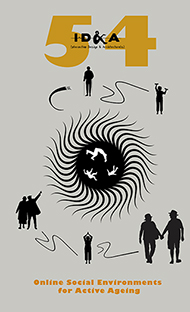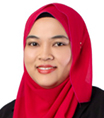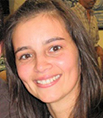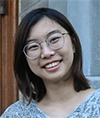Authors of the present issue
(https://doi.org/10.55612/s-5002-054)


Nor Athiyah Abdullah
is a senior lecturer and head of Service Computing cluster at the School of Computer Sciences, Universiti Sains Malaysia (USM). She holds tertiary qualifications in Software Engineering, Masters in Computer Science and a PhD in Software and Information Science in 2009, 2011 and 2016 respectively. Her research interests include social media, human aspect of HCI, usability studies and disaster communication. She teaches courses in the areas of Software Engineering, Computer Sciences and Informatics. She has published in numerous international journals and delivered presentations at international conferences.is a senior lecturer at the School of Computer Sciences, Universiti Sains Malaysia, under the service computing research cluster. She is involved in various research related to her expertise and area of interests, particularly the psychological influence of HCI, human behaviour in social media, survey research, social informatics, requirement engineering, usability studies, and social media.

Hassan Bello
is currently a PhD candidate at the School of Computer Sciences, Universiti Sains Malaysia (USM). He received his Bachelor Degree in Mathematics and Masters Degree in Computer Science from Bayero University Kano, Nigeria. His research interests include E-assessment, E-learning, and Information Systems Management.

Renee (Xinyu) Chen
is an undergraduate student at the School of Computing at Queen’s University. She is exploring social counter measures for COVID-19 using interactive homeware that changes colour and smell to connect us with the outdoor environment indoors.

Elísio Costa
Professor at the Department of Biological Sciences of the Faculty of Pharmacy of the University of Porto and researcher in the Research Unit on Applied Molecular Biosciences of the same institution (UCIBIO). He is also the coordenator of the Competence Center on Ageing of the University of Porto, which aims to work as a convergence Centre of all the skills and knowledge of the University in the field of ageing; and coordinator of the activities of the University of Porto as an INNOSTARS RIS-Hub of EIT-Health. He has been member of the European Innovation Partnership on Active and Healthy Ageing (EIP-AHA) on the Action Group A1 on Adherence to Prescription and Medical Plans, being the co-coordinator of one of the objectives of this Action Group. Moreover, he is the scientific coordinator of the EIP-AHA four-starred Reference Site: Porto4Ageing. He is author of more than 200 publications (orcid.org/0000-0003-1158-1480) and has collaborated in national and international research projects in the field of chronic diseases, namely chronic kidney disease and ageing (SACHI2; SKILLS4ADHERENCE; ICTSKILLS4ALL, FAIR4HEALTH, others).

Liliana Vale Costa
is a Researcher at the DigiMedia Research Centre and Invited Lecturer at UA. She holds an European Ph.D. in Information and Communication in Digital Platforms at the University of Aveiro and University of Porto, a M.A in Multimedia Communication and a BSc in New Technologies of Communication, both at UA. Her research interests are universal design, digital games, ageing studies, intergenerational interactions, transmedia storytelling, human-computer interaction, computer-mediated communication, natural interfaces, eHealth, mobile apps and digital inclusion.

Inês Dias

Meara Donovan
graduated from Queen’s University with a Bachelor of Computing and a BA in world languages. Her work at iStudio Lab focused on designing for people’s wellbeing by fabricating e-textile artefacts. She is currently working and hopes to pursue a masters in Hispanic Studies.

Heidi Elnimr
is an architect and a researcher in TUWien, with 17 years of international experience in architecture, interior design, technical details, and project management. Currently, she is part of an exciting project called 'Smart Healthy Age Friendly Environments (SHAFE).' This project is part of NET4Age-Friendly COST Action. Heidi has broad experience in healthcare architecture and is developing her experience through research.

Irantzu Fernández
holds a Sociology degree from the University of Barcelona. She has a Society of Information and Knowledge Master from the Universitat Oberta de Catalunya (UOC) and a Teaching Master from the University of the Balearic Islands (UIB). She is a Ph.D. student in educational technology at the University of the Balearic Islands (UIB) and was involved in the Senior University of this institution (UOM) as the technology teacher of the program. Her research interests include Personal Learning Environments, andragogy, self-directed learning and learning motivation through life.

Sónia Ferreira
is an Assistant Professor and member of the Center Studies in Education and Innovation at the Polytechnic Institute of Viseu. Holds a degree in Social Communication from the Polytechnic Institute of Viseu, a Master’s degree in Multimedia Communication from the University of Aveiro, and a PhD in Information and Communication in Digital Platforms from the University of Aveiro and the University of Porto. Research interests include digital solutions for older adults, audiovisual, video ad, digital narratives, digital inclusion, lifelong learning, quality of life promotion through ICT, and coordinating the projects: - Online methodologies exploration in the development of skills in the audiovisual area (IPV Special Supports) and; - Content consumption and sharing on the Internet among higher education students

Enosha Hettiarachchi
is a Senior Lecturer at the University of Colombo School of Computing (UCSC), Sri Lanka. She obtained a PhD in Information and Knowledge Society (Network and Information Technologies area) in 2013 with the highest qualification of 'Excellent Cum Laude', focused on e-assessment and technology from the Universitat Oberta de Catalunya (UOC), Barcelona, Spain. After the completion of her PhD, she was offered a Postdoctoral Researcher position at the Internet Interdisciplinary Institute (IN3) of the UOC, Barcelona, Spain. She has obtained both her Bachelor’s and Master’s degrees in the field of Computer Science from the UCSC, Sri Lanka. Her main research interests are technology-enhanced assessment, e-learning, technologies and tools for distance education, learning object repositories, Learning Analytics, Educational Technology, Human-Computer Interaction, Big Data, Game-based Learning, and Gamification.

K.P. Hewagamage
obtained his B.Sc. special degree in Computer Science (First Class Honors) from the University of Colombo (UOC) and the Doctor of Information Engineering from Hiroshima University in Japan. He is a professor in Computer Science in the Department of Information Engineering at the University of Colombo School of Computing (UCSC) and former director of the UCSC. He has a key research interest in areas of Human-Computer Interaction, Software Engineering, e-Learning and ICT for Education and Development. He was the author or co-author of more than 125 research publications during the last 20 years and his h-index is 13 according to Google scholar. He also received more than 20 national and international awards for his scholarly work in research. Those awards include the Professor Mohan Munasinghe Award for the outstanding Computer Science graduate in 1994 at the convocation of the UOC, the best paper award at IEEE International Conference of Visual Languages in 1999, the research excellence award by the UOC in 2004, 2006 and 2012, UNESCO award ICT for education in 2007, and the excellent paper award at the IEEE Ubi-Media conference in 2018. He is a senior member of IEEE, a member of ACM, and an academic advocate of ISACA. He was a chair of the IEEE Computer Society Chapter in Sri Lanka. He was the head of the Department of Information Systems Engineering, of UCSC and coordinator of the e-learning Centre of UCSC. He was also the coordinator of the National e-Learning Project funded by the Swedish International Development Agency (Sida) and was the principal investigator of many international projects funded by international agencies. At the same time, he has helped the UOC to establish international collaboration with many foreign universities and agencies. He is a visiting researcher at Stockholm University, Sweden and Shimane University, Japan.

Kuang-Ting Huang
received his Master of Science from National Taiwan University and Ph.D. from University of Washington. He is currently an assistant professor at Department of Architecture, National Taipei University of Technology. As the founder of Spatial Analysis and Representation Lab, he has specific research interest in analytic mapping, digital representation and modeling of space, and comparative urbanism.

Fabian Huber
finished his BSc in Media Informatics at Vienna University of Technology in 2020. During his studies there, he discovered his interest in user experience and interaction design. Because of this, he is currently studying towards his Master degree in Interaction Design at National Taipei University of Technology.

Lee Jones
is a postdoctoral fellow with the iStudio Lab. Before joining the lab, she did her PhD at the Creative Interactions Lab at Carleton University, where her thesis focused on e-textiles, hybrid craft, and textile personal fabrication. In her research she develops DIY toolkits so individuals can design and create interactive soft technologies to suit their own needs. She also loves running community e-textile workshops at art galleries and makerspaces, and creating interactive participatory artworks. More on her page: LeeJones.ca

Olga Kolotouchkina
Ph.D. in Communication Sciences and Lecturer of Communication and Branding. Member of the American Academy of Advertising, ECREA, and the International Place Branding Association. Her research interests include the field of place branding, disability visibility, citizen participation, and public diplomacy. She participates in the projects “The Public Diplomacy of Ibero-American Mega-Cities: Communication Strategies and Soft Power to influence global environmental legislation” (RTI2018-096733-B-I00), and “Rise Women with disabilities in social engagement” (H2020-MSCA-RISE-2015-690874). Her research has been disseminated in international conferences and publications in SPI, WoS, and Scopus. She has been a visiting professor at the University of Toronto and Waseda University in Tokyo.

Teemu Korpilahti
is a doctoral student in the field of Visual Communication Design at Aalto University, Finland. His research focuses on the visual design and classification of interface icons and on user experience in digital platforms. He is also the design director of Crasman, where his work includes service, concept and user experience design of online services.

Anne Liu
completed her Computing and Cognitive Science degree at Queen’s University. While she worked at iStudio Lab, she focused on the design of interactive physical artefacts that support mental health issues. She is currently working as a Design Technologist at Shopify.

Carmen Llorente-Barroso
Ph.D. in Advertising and Audiovisual Communication from the Complutense University of Madrid (UCM) and Extraordinary Doctorate Award 2009-2010. Senior Lecturer of Advertising and Strategic Communication. Her lines of research are focused on the study of communication aimed at active aging and the inclusion of people with disabilities. Currently, she participates in the PROVULDIG2-CM (H2019/HUM-5775) and COMPENSA (PID2019-105398RB-C21) projects. She has published several articles in indexed journals (WoS and Scopus) and has regularly participated in international conferences. In 2014, she carried out a research stay at Haas School of Business (UC, Berkeley), financed with a “José Castillejo” Grant (CAS14/00052). Her research career has been recognized with two six-year research periods by the CNEAI.

Luis Mañas-Viniegra
Ph.D. in Audio-visual Communication and Advertising with an Extraordinary Doctorate Award from Complutense University of Madrid. Senior Lecturer, Director of the UCM Brand Lab research group, and a research member of the R+D+i State Plan Project, ref. PID2019-105398RB-C21, which is related to Disability and Digital Competence in the Audio-visual

Massod Massodian
is a Professor of Visual Communication Design at Aalto University, Finland. His research interests include visual design, interaction design and visualization, particularly visualization of temporal and spatial data in areas such as health, energy, and sustainability. He is also interested in investigating the role of visual thinking and perception in the design of visual interfaces and interactions.

Óscar Mealha
Full Professor at the Department of Communication and Art, University of Aveiro (UA), Portugal and Director of the Doctoral Program in New Media. He develops his research at DigiMedia (digimedia.web.ua.pt), in the area of 'Knowledge Media and Connected Communities' with several projects, masters and doctoral supervisions and publications on interaction design and analysis techniques and methods, namely for User eXperience design and evaluation, usability evaluation, and visualization of interaction/infocommunication activity. He is involved in infocommunication mediation projects such as 'SMILE - Smart Indicators to Leverage Citizen Engagement” in municipalities and smart territories, and 'SMARTEEs – Smartphone in Educational Ecosystems' within school clusters.

Diego Moreira da Rosa
holds a master's degree in Computer Science from the Federal University of Rio Grande do Sul (2004) and is currently a Ph.D. student at Pontifical Catholic University of Rio Grande do Sul. He teaches Human-Computer Interaction and other computing disciplines at Federal Institute of Rio Grande do Sul since 2013. His research interest areas include interaction design patterns, cross-cultural design, social and cultural aspects in HCI, and the intersections between multilingualism and interaction design.

Sara Nabil
is an Assistant Professor of HCI at Queen’s University (Canada), head of the iStudio Lab, and an alumna of Newcastle University (UK). Her research integrates interior design with interaction design, using soft sensors, fabric circuits, e-textiles and smart materials that are malleable, shape-changing and colour-changing. Her innovative techniques and digital fabrication methods facilitate the design of everyday computational objects, wearables, surfaces and spaces in calm and ubiquitous technology. Her work aims to support the living quality of marginalized groups such as refugees, people with dual-identities, and people with physical disabilities. She has carried out in-the-wild fieldwork in public spaces, design studios, galleries, museums and refugee camps, and has written on Human-Building Interaction (HBI), Interactive Architecture, and Interactive Interior Design, or what she coined as ‘Interioraction’. Her current work explores the interface between physical computing,wearables, interiors, art, and architecture. In 2016, Sara was awarded the ‘Best Design Award’ by the Great North Museum, and in 2022, she won the Best Design Award at the FabFest 2022 Design Challenge. Sara’s interactive prototypes have been displayed at a number of exhibitions including the Carleton Community Art Exhibition (CUAG, Canada 2020), ‘Living with Adaptive Architecture’ (Lakeside Arts Gallery, UK 2018), the ‘Immersive Hive’ (Great North Museum, UK 2018), and the annual London Design Festival (2018).

Alaa Nousir
is an MSc student at the iStudio Lab in Queen’s University School of Computing. She is experimenting with smart materials such as thermochromic pigments to design interactive artwork that conveys wellbeing and connectedness between people on the autism spectrum and their carers.

Cláudia Pedro Ortet
is attending the Ph.D. in Information and Communication in Digital Platforms at the University of Aveiro and University of Porto, having a Ph.D. Scholarship from FCT. The research theme of her thesis focuses on the evaluation of the impact of gamification strategies in the information and communication services of cyclotourism for senior citizens. She holds a M.A in Multimedia Communication (Interactive Multimedia) and a BSc in Languages and Business Relations (English, French and Chinese), both at University of Aveiro. Her research interests are methodologies, gamification, digital games, digital inclusion, ageing studies, cyclotourism research, gerontechnology, human-computer interaction and computer-mediated communication.

Francisco Regalado
holds a M.A in Multimedia Communication (Interactive Multimedia), and a BSc in New Technologies of Communication from University of Aveiro. Currently, he is a Ph.D. student in Information and Communication in Digital Platforms at University of Aveiro and University of Porto, holding a FCT Ph.D. scholarship; and a research fellow at DigiMedia Research Centre. As part of his PhD thesis, he is studying the impact of social digital games in older adults’ digital competences on online communities. His research interests are digital platforms, human-computer interaction, computer-mediated communication, digital games, gamification, and ageing studies.

Milene Selbach Silveira
received her M.Sc. in Computer Science from Federal University of Rio Grande do Sul in 1996 and her Ph.D. in the same area from Pontifical Catholic University of Rio de Janeiro in 2002. She is a professor at Pontifical Catholic University of Rio Grande do Sul since 1994, doing research on Human-Computer Interaction (HCI), focusing on its relations with end-user development, narrative visualization, learning objects, and innovative HCI teaching methodologies. In 2021, she was the very first researcher to receive the HCI Community Service Award, from the Special HCI Interest Group of the Brazilian Computing Society, recognizing her contributions to the development, strengthening, and success of the Brazilian HCI Community in various functions and aspects.

Nan-Ching Tai
received his Master of Architecture and Ph.D. in the Built Environment from the University of Washington. He is currently a faculty member at Department of Interaction Design of National Taipei University of Technology. His research interest focuses on space perception and tangible interaction. For space perception, he is interested in integrating related technologies of high dynamic range imaging and displaying techniques to create a pictorial environment that can reflect perceptual reality and using this alternative environment to investigate various perceptual issues in the field of design. For tangible interaction, he employed the methodology of simulation-based design to integrate the embedded system into the design of tangible form in different scales that can have intangible positive impact on human interaction with the world surrounding us.

Gemma Tur
holds a Ph.D. in educational technology from the University of the Balearic Islands (UIB). She is lecturer in the Department of Applied Pedagogy and Educational Psychology of UIB and researcher in the Group of Infancy, Technology, Education and Diversity in the field of Educational Technology of the same university. She is the coordinator of diverse programs in Ibiza off-campus Centre such as Primary and Secondary Teacher Education programs and the Open Senior University. She has been involved in research in national and international groups, collaborates in many conferences and has published numerous articles in the field. Her research interests include e-portfolios and Personal Learning Environments, the open education for teachers’ professional development, social media for learning and in general, technology-enhanced learning in Teacher Education.

Santos Urbina
is a full professor at the University of the Balearic Islands (UIB). First, he graduated in Educational Psychology and after he graduated in Pedagogy. After a few years as a part-time professor, he carried out his doctoral thesis, and obtained a full-time position in the Department of Applied Pedagogy at the UIB, in the late 1990s. He is part of the Educational Technology Group of the UIB and, both his teaching work and his research work, focus on this field of study. The main lines of research in which he works are: design, production and use of teaching aids; technology enhanced learning environments; curricular insertion of ICT.

Ana Isabel Veloso
is Dean of the Department of Communication and Art of UA, Associated Professor with Habilitation in Communication Sciences and Technologies and member of the DigiMedia Research Center. She has also been the coordinator of several research projects, such as SEDUCE 2.0, SEDUCE, EYES ON GAMES and IMP.cubed. She did her Ph.D. in Communication Sciences and Technologies at UA, and obtained her MSc in Biomedical Engineering and bachelor’s in Informatics Engineering from the University of Coimbra. Her research interests include video games, gerontechnology and other new media applications and evaluation for different contexts and publics.

Mónica Viñarás-Abad
Ph.D. in Advertising and Audiovisual Communication from the Complutense University of Madrid and Extraordinary Doctorate Award 2005-2006. Lecturer of Corporate Social Responsibility and Intangibles Management. Member of two research group, UCM BRAND LAB and UCM Responsible Communication. Viñarás-Abad has participated in several research projects funded by public and private institutions, all of them focused on the social impact of communication. She has more than 60 scientific publications. Her lines of research include communication with vulnerable audiences, corporate communication in the cultural sector, and corporate social responsibility.

Eliza Wallace
is a graduate of Queen’s University with a Bachelor of Computing (Honours) in Cognitive Science. Her cognitive science specialization focused on psychology and linguistics. She also pursued a Certificate in Entrepreneurship, Innovation & Creativity. In 2020, She was nominated for a bilateral exchange to Uppsala University in Sweden.

Wasura D. Wattearachchi
obtained his degree, Bachelor of Science (Honours) in Computer Science from the University of Colombo School of Computing (UCSC) with First Class Honours. Due to his academic excellence, he was awarded Professor V.K. Samaranayake Award for the Most Outstanding Graduate of UCSC, the Professor Mohan Munasinghe Award for Best Performance at UCSC and the Professor Tilak Hettiarachchy Award for Academic Excellence at the University of Colombo (UOC) at the General Convocation of UOC 2019. Further, he was awarded the Best ICT Student (Undergraduate Category) in Sri Lanka at the CSSL (Computer Society of Sri Lanka) National ICT Awards 2020. He was selected among the top 10 undergraduates in Sri Lanka to represent the UOC in “Huawei Seeds for the Future 2018” in China which is a rare opportunity that an undergraduate could get. Further, he was fortunate to participate in the “Cornell, Maryland, Max Planck Pre-doctoral Research School 2020 (CMMRS)” in Saarbruecken, Germany by getting included among the only two undergraduates who were chosen to represent Sri Lanka. He has a key research interest in the areas of Human-Computer Interaction and Machine Learning. For his final year research, he developed a keyboard for Android devices that can suggest adaptive functions based on the current emotion of the user and the context, which enhanced the acceptability and usability of a mobile device. He currently has three (3) international full-paper publications that have been presented at conferences in countries such as Indonesia, Singapore and Sri Lanka.

